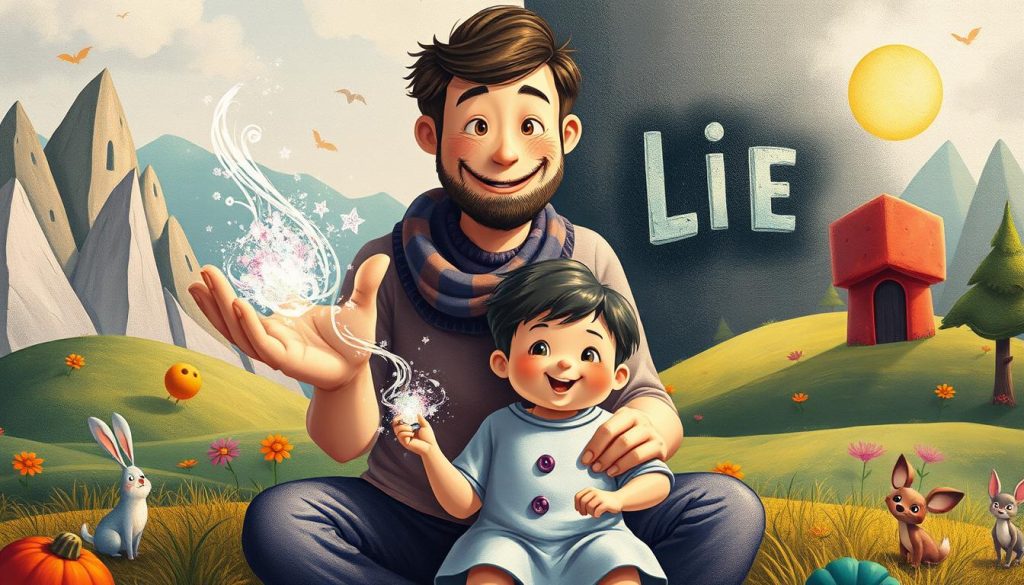Have you ever thought about lying to your kids? It’s a tough choice many parents face. They want to be honest but also protect their children. In today’s world, many parents wonder if some lies might be good for their kids.
Parenting is hard, and sometimes, a lie seems easier. A big 84% of American parents said they lie to shape their child’s behavior. Some lies, like making a child feel better about themselves, might seem okay. But others can hurt trust and make it harder to connect with your child.
Key Takeaways
- 84% of American parents have lied to their kids to influence behavior.
- Common lies include exaggerating achievements and avoiding difficult conversations.
- Maintaining myths like Santa Claus is typical but controversial among parents.
- Lying can impact children’s self-esteem and parent-child trust.
- Parents should aim for honesty and clarity, especially with sensitive topics.
Understanding the Temptation to Lie
Parents often tell little white lies for many reasons. They might do this to avoid long explanations or because they’re unsure what to say. For example, in stepchild relationships, they might soften the truth to avoid hurting feelings.
Pinocchio Parenting is a term for when parents rely too much on lies. This is common in situations involving divorce and children. Parents try to protect their kids from harsh realities. They also use lies to handle everyday situations with their children.
Common Little White Lies
A mother might say, “The store is closed,” to stop her child from asking for candy. These small lies might seem okay, but they can lead to problems. For instance, they can cause middle child syndrome, where the middle child feels ignored and seeks attention.
Being honest, like explaining why candy isn’t a good choice, builds trust. It helps children feel secure and understood.
Lies for Protection and Secrecy
During tough times, like when talking about puberty or divorce, parents often lie to protect their kids. They might not tell the whole truth to keep their child’s innocence. But, these lies can hurt trust over time.
Biblical teachings, like Proverbs 12:22, remind us of the value of honesty. They tell us that lying is wrong.
The Role of Santa Claus and Tooth Fairy
Believing in Santa Claus and the Tooth Fairy is one of the first lies kids learn. These stories add to the magic of childhood. They make kids happy and curious.
But, when kids find out the truth, it can make them question their parents’ honesty. Parents should find a balance between keeping the magic alive and being truthful. This helps keep trust strong.

Impact of Lying on Parent-Child Trust
Trust is the base of a strong parent-child bond. Being honest helps create a transparent and trustworthy relationship. Studies show that lying can harm trust and communication in families. Starting with honesty can improve parenting in many ways, like managing kids screen time and promoting body positivity for kids.

Building Trust Through Honesty
Being honest in talks, like about money or remarriage and children, boosts a child’s trust in parents. Research shows honest parents encourage open talks, leading to strong, supportive bonds. Talking openly about kids screen time and body positivity for kids makes kids feel safe and valued.
Consequences of Broken Trust
On the other hand, lying can have long-term effects. Kids who find out may doubt their parents’ words, hurting trust. This can lead to problems in managing kids screen time and promoting body positivity for kids. As kids get older, dishonesty can damage relationships and make trusting others harder, including in remarriage and children situations.
When a Lie Might Be Justified
There are times when parents might think about not telling the truth or telling a small lie. This is to protect their child’s feelings. Topics like sex, substance abuse, or keeping surprises like birthday parties are common reasons.
It’s natural to wonder if these lies are okay. Are they justified to keep our kids happy and safe?

Handling Sensitive Topics
Talking about tough subjects with kids can be hard. Issues like eating disorders or social media safety need careful handling. Parents might use online family therapy to help with anxiety.
In these situations, telling a gentle lie can be a way to protect without lying too much.
Preserving Surprises
Keeping the magic of childhood alive with surprises is a joy. Parents often use small lies to keep the wonder alive. This includes the Easter Bunny, Tooth Fairy, and Santa Claus.
While some might question the ethics, research shows these lies don’t harm kids. They can actually bring happiness. So, telling small lies to make our kids happy is sometimes okay.
Parenting Challenges: To Lie or Not to Lie?
Parenting is full of tough choices, like deciding whether to lie to your child. It’s hard to know when to tell the truth and when to protect them. Lying might seem like an easy way out, but it can harm their trust in you.
Kids start learning about lying around age 2 or 3. They might lie to avoid trouble or get attention. Understanding why they lie is key. For example, they might lie about being good at something because they’re scared of not being enough.
Talking to kids in a way they can understand helps keep trust strong. When you talk about tough topics like mental health or drugs, be honest but gentle. This approach is good whether you’re teaching them about the environment or sports.
Using positive parenting and spending quality time with your child can help them feel less inclined to lie. Don’t punish them too harshly, as this can make them afraid to be honest. Instead, create a safe space where they can share their feelings and problems openly.
FAQ
Is it ever okay to lie to your kids?
Why do parents tell little white lies?
What are common little white lies parents tell?
Why do parents lie for protection and secrecy?
What is the role of Santa Claus and the Tooth Fairy in parenting lies?
How does lying impact parent-child trust?
How can parents build trust through honesty?
What are the consequences of broken trust in parenting?
When might a lie be justified in parenting?
What are the strategies for handling sensitive topics with kids?
How do lies used to preserve surprises impact kids?
What are the challenges of deciding whether to lie or not in parenting?
How can parents adopt eco-friendly parenting strategies while navigating these challenges?
This post contains affiliate links. If you click on a link and make a purchase, I may earn a small commission — at no extra cost to you. Thank you for supporting this blog and helping me keep the patterns free! Read the full Affiliate Disclosure & Transparency.
